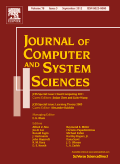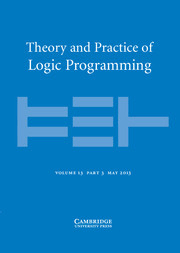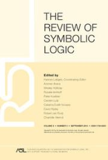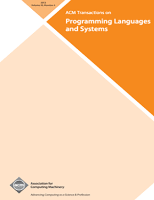
Logical Methods in Computer Science
Scope & Guideline
Unlocking new pathways in theoretical computing.
Introduction
Aims and Scopes
- Logic and Formal Methods:
The journal extensively covers formal logic, including propositional, predicate, and modal logics, as well as their applications in computer science. - Automata Theory and Formal Languages:
Research on automata theory, including finite automata, pushdown automata, and their relationships with formal languages and computational complexity, is a key focus. - Model Checking and Verification:
Studies related to model checking, verification of systems, and their logical foundations are prominently featured, emphasizing the importance of correctness in computational systems. - Type Theory and Programming Languages:
The journal publishes works on type theory and its implications for programming languages, including type systems, type inference, and type-based reasoning. - Game Semantics and Interaction:
Game semantics is a recurring theme, exploring the connections between logic, games, and computer science, particularly in the context of concurrent and distributed systems. - Quantum Computing and Logic:
Research on the integration of logic with quantum computing, including quantum automata and quantum programming languages, reflects the journal's commitment to emerging computational paradigms.
Trending and Emerging
- Higher-Order Logic and Type Systems:
There is a growing interest in higher-order logic and advanced type systems, reflecting a trend towards more expressive frameworks that can capture complex computational phenomena. - Quantum Logic and Computation:
Research at the interface of logic and quantum computing is on the rise, showcasing the relevance of logical methods in understanding quantum algorithms and their implications. - Asynchronous and Distributed Systems:
The exploration of logical frameworks for asynchronous and distributed systems is increasingly prominent, emphasizing the need for robust verification methods in these complex environments. - Interdisciplinary Applications of Logic:
Emerging themes include the application of logical methods to diverse fields such as social networks, economics, and bioinformatics, indicating a trend towards interdisciplinary research. - Game-Theoretic Approaches to Logic:
Game semantics and game-theoretic methods are gaining traction, providing new insights into the interaction between logic, computation, and strategy.
Declining or Waning
- Classical Automata Theory:
Research focused solely on traditional automata theory without connections to broader computational contexts has become less frequent, possibly due to the rise of more complex models and applications. - Basic Propositional Logic:
Studies centered on foundational propositional logic, without integration into more advanced logical frameworks or applications, appear to be waning as researchers pursue more sophisticated logical constructs. - Static Analysis Techniques:
While still relevant, there has been a noticeable decrease in papers solely dedicated to static analysis methods, as interest shifts towards dynamic and hybrid analysis techniques that address real-world complexities.
Similar Journals

Frontiers of Computer Science
Unleashing Insights at the Crossroads of Theory and PracticeFrontiers of Computer Science is a leading peer-reviewed journal dedicated to advancing the field of computer science through the publication of high-quality research articles, reviews, and theoretical discussions. Published by HIGHER EDUCATION PRESS, this journal has gained significant recognition, currently boasting a prestigious impact factor and ranking in the Q1 quartile for both Computer Science (miscellaneous) and Theoretical Computer Science categories in 2023. With a focus on the intersection of computational theory and practical applications, it serves as a vital platform for researchers, professionals, and students alike who are eager to contribute to and stay updated with groundbreaking developments. The journal’s scope encompasses a wide range of topics, reflecting the diverse nature of computer science today. Operating from Beijing, China, it emphasizes Open Access, ensuring that vital research is readily available to the global academic community. With its convergence period spanning from 2013 to 2024, Frontiers of Computer Science remains committed to fostering innovation and scholarly dialogue that drives the future of technology.

JOURNAL OF COMPUTER AND SYSTEM SCIENCES
Advancing the frontiers of computational knowledge.The Journal of Computer and System Sciences is a distinguished publication founded in 1967 and continually striving to push the boundaries of knowledge in computer science and applied mathematics. Published by Academic Press Inc, Elsevier Science, this journal boasts impressive credentials, holding a Q1 quartile ranking across multiple categories including Applied Mathematics, Computational Theory and Mathematics, Computer Networks and Communications, and Theoretical Computer Science as of 2023. With a focus on innovative research and comprehensive theoretical developments, this journal serves as a pivotal forum for authors and readers alike, facilitating cutting-edge contributions to the field. The journal is not currently open access, providing a curated selection of high-quality articles for its subscription residents. By engaging with this journal, researchers, professionals, and students can gain insight into the latest trends, prominent methodologies, and significant findings that shape the modern landscape of computing and systems analysis.

Proceedings of the ACM on Programming Languages-PACMPL
Fostering Accessibility to Groundbreaking Programming Insights.Proceedings of the ACM on Programming Languages (PACMPL) is a premier journal that focuses on the advancement and dissemination of knowledge in the field of programming languages. Published by the Association for Computing Machinery (ACM), this rigorous journal serves as a vital platform for researchers, professionals, and students alike, contributing significantly to software development and safety across diverse applications. With impressive rankings in Q1 quartiles for both Safety, Risk, Reliability and Quality and Software, and a recognition in the Scopus Rankings, PACMPL stands out as a critical resource for cutting-edge research. The journal is particularly relevant in today’s rapidly evolving technological landscape, focusing on innovative practices and methodologies in programming languages that enhance system reliability and performance. As an Open Access publication since its convergence in 2017, PACMPL not only emphasizes high-quality peer-reviewed research but also prioritizes accessibility, making significant contributions to the global knowledge base. By empowering researchers and practitioners with the latest findings and trends, PACMPL continues to firmly establish its importance in the computing field.

THEORY AND PRACTICE OF LOGIC PROGRAMMING
Empowering Researchers with Cutting-Edge Logic Programming Discoveries.THEORY AND PRACTICE OF LOGIC PROGRAMMING, published by Cambridge University Press, is a premier academic journal that delves into the evolving field of logic programming, offering insights and advancements from 2001 to 2024. With an ISSN of 1471-0684 and an E-ISSN of 1475-3081, this journal serves as a vital resource for researchers, professionals, and students interested in areas such as artificial intelligence, computational theory, and software development. In 2023, the journal was recognized for its excellence, achieving Q1 status in Computational Theory and Mathematics and Q2 in several other categories, underscoring its significant impact within the academic community. Despite not being open access, its robust content, curated by esteemed scholars, guarantees high-quality research and innovative methodologies that are crucial for advancing the field. The journal's rigorous peer-review process and its standings in Scopus rankings further emphasize its relevance and authority, making it a quintessential platform for disseminating key findings and fostering scholarly dialogue.

Bulletin of the European Association for Theoretical Computer Science
Advancing Theoretical Insights in Computer ScienceBulletin of the European Association for Theoretical Computer Science is a distinguished journal dedicated to the field of theoretical computer science, published by the European Association for Theoretical Computer Science. With its focus on theoretical underpinnings, algorithmic framework, and the advancement of computational theories, this journal serves as a crucial platform for researchers, professionals, and students alike. While not an open access journal, it offers vital insights and findings that significantly contribute to the academic community in theoretical computer science. The journal is headquartered in Greece, at the Computer Technology Institute and Press-CTI in Rio, symbolizing a rich tradition of scholarly exchange within the European context. Researchers aiming to disseminate their work in this niche yet impactful area will find the Bulletin's blend of rigor and relevance invaluable as they seek to push the boundaries of knowledge in computational theory.

FUNDAMENTA INFORMATICAE
Advancing the Frontiers of Informatics and Mathematics.FUNDAMENTA INFORMATICAE is a distinguished academic journal published by IOS PRESS, focusing on the critical intersection of informatics, mathematics, and computer science. Since its inception in 1988, this journal has served as a vital resource for researchers and professionals alike, providing a platform for innovative studies in Algebra and Number Theory, Computational Theory and Mathematics, Information Systems, and Theoretical Computer Science. With an impressive HIndex, and ranking in the Q3 and Q4 categories across various disciplines as of 2023, it underscores its contribution and relevance in advancing the body of knowledge in these fields. The journal's commitment to excellence is reflected not only in its rigorous peer-review process but also in its notable rankings on Scopus, which positions it favorably among its peers. Though not yet available as an open access journal, FUNDAMENTA INFORMATICAE remains a crucial academic venue for authors wishing to disseminate their findings to a global audience, promoting collaboration and further research within the scientific community.

Review of Symbolic Logic
Advancing the Frontiers of Logical ThoughtReview of Symbolic Logic is a prestigious academic journal published by Cambridge University Press, dedicated to advancing the field of logic through critical analysis and innovative research. Established in 2008, the journal has become a key fixture in the academic community, particularly recognized for its contributions in the realms of logic, mathematics (miscellaneous), and philosophy. With an impressive classification of Q1 across multiple categories in 2023, it ranks within the top echelons of its field, standing at 15th out of 41 in Logic and 29th out of 90 in miscellaneous mathematics, positioning itself as essential reading for scholars and practitioners alike. Although not Open Access, the journal offers robust access options through institutional subscriptions, providing an expansive platform for the dissemination of high-quality research. Review of Symbolic Logic aims to foster a deeper understanding of symbolic logic's applications and implications while inspiring emerging scholars and seasoned researchers to further the dialogue within this vibrant area of study.

ACM TRANSACTIONS ON PROGRAMMING LANGUAGES AND SYSTEMS
Pioneering Research for a Dynamic Computing LandscapeACM Transactions on Programming Languages and Systems (ISSN: 0164-0925, E-ISSN: 1558-4593) is a prestigious journal published by the Association for Computing Machinery, focusing on advancing the field of programming languages and systems. Established in 1979, this enduring publication has become a significant resource for researchers and practitioners alike, with a convergence extending to 2024. The journal maintains a strong presence in the academic community, currently placed in the Q2 category for Software in 2023, demonstrating its commitment to high-quality research. With a Scopus ranking of #260 out of 407 in Computer Science Software, it highlights a unique niche that bridges theoretical foundations and practical implementations. Although it does not offer open access, the journal ensures quality dissemination of tools, methodologies, and innovations that cater to both seasoned professionals and emerging scholars. The ACM Transactions on Programming Languages and Systems thus plays a crucial role in shaping the future of programming languages and their applications, making it an essential read for anyone vested in the field.

ACTA INFORMATICA
Connecting Ideas in Networks and Communications.ACTA INFORMATICA is a prestigious academic journal published by Springer, dedicated to advancing the fields of computer networks and communications, information systems, and software engineering. With an ISSN of 0001-5903 and an E-ISSN of 1432-0525, the journal has continued to thrive since its inception in 1971 and is set to cover research up until 2024. Although it currently operates within a Q3 category in its respective fields, it is recognized for providing a platform for high-quality, peer-reviewed research, which is essential for fostering innovation and knowledge dissemination in computer science. While it does not offer an open access option, scholars benefit from its rigorous editorial standards and comprehensive coverage of significant trends and methodologies. The journal is conveniently based in New York, NY, USA, further enhancing its accessibility to a global audience. Researchers, professionals, and students alike will find ACTA INFORMATICA a valuable resource for staying abreast of the latest developments and breakthroughs in this vital area of study.

JOURNAL OF AUTOMATED REASONING
Unlocking Insights into Automated ReasoningJOURNAL OF AUTOMATED REASONING is a premier academic journal published by SPRINGER, focusing on the dynamic and evolving fields of Artificial Intelligence, Computational Theory and Mathematics, and Software. With an ISSN of 0168-7433 and E-ISSN 1573-0670, this journal ranks impressively in the second quartile (Q2) across multiple categories, reflecting its significant contribution to the advancement of knowledge in automated reasoning methodologies. Since its inception in 1985, it has served as a vital platform for researchers and professionals to share groundbreaking findings and innovative techniques, facilitating the exploration of algorithms, logical frameworks, and reasoning processes that underpin artificial intelligence systems. Although it does not currently offer Open Access options, it remains a highly regarded resource, cited widely in academia, with its impactful publications reflecting deep insights and rigorous scholarly standards. The journal’s esteemed status and its ongoing commitment to fostering a greater understanding of automated reasoning make it an invaluable asset for those dedicated to pushing the boundaries of these interdisciplinary fields.